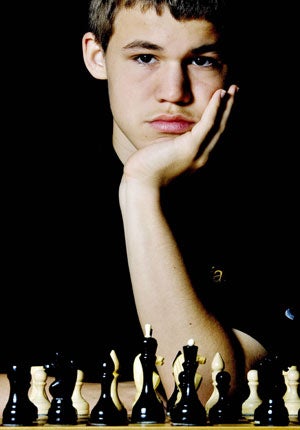Model grandmaster plans his next move to change the face of chess
Luke Blackall talks to Magnus Carlsen about his two careers

Even its staunchest defenders would struggle to describe chess as sexy, but the growing stature of Magnus Carlsen could change all that. Not only is the 20-year-old Norwegian the number two ranked chess player in the world, but he is also carving out a highly successful career in the world of fashion modelling.
Once known as the Mozart of chess, for his prodigious talent and astonishingly rapid ascent to the top of the game, today his brooding yet boyish looks and contract with the G-Star RAW fashion label mean he is just as likely to be compared to the teenage singer and heart-throb Justin Bieber as he is to the Austrian composer.
Garry Kasparov, one of the greatest players of all time and the young Norwegian's former coach, has said of him: "Before he is done, Carlsen will have changed our ancient game considerably." Ordinarily, Carlsen might visit the UK to compete at events such as the London Chess Classic, but this time he is here in his other professional capacity, as the face of the aformentioned clothing label.
Within the game, the response to his newfound celebrity has been "quite positive", he says. "There are always going to be some jokes and laughter, but I think a lot of them appreciate that it might be very positive for chess."
Carlsen's association with G-Star RAW came a couple of years ago when he was spotted playing chess on Dutch television by an executive at the fashion label. Since then he has become the face of the brand, appearing alongside actresses such as Liv Tyler and Gemma Arterton on billboards and at New York fashion week.
The modelling career came as a "surprise", having never thought of himself as a model. "It's been interesting, so different from chess," he says.
Despite the differences, he has been able to draw similarities between the two during the long modelling shoots and also find an outlet for his desire to win. "Just to stand in the same position for a lot of time, it takes some concentration," he says. "There is a certain competitiveness because when I'm told to do something, I want to do it right. I don't want to do a bad job."
Few players have received the sort of attention outside the game that Carlsen has in recent years. Carlsen is single and still lives in the basement of his family's house near Oslo in Norway. His yearly average of between 70 and 80 matches is fewer now than before, as there just aren't that many tournaments for players of his calibre. Modelling shoots are arranged for when he is neither playing nor preparing for a match. And unlike the others he competes against at the very top level, he doesn't have a coach, having parted company with Kasparov last year. Now he works on his game on his own.
For the most part, he comes across as an ordinary 20-year-old, genuinely surprised by the new level of interest in his life and career.
For someone who is reported to earn over a million dollars a year from sponsors and endorsements, he says that while it is nice to enjoy financial security, "money is never my motivation".
Even the Bieber comparison seems to leave him a little embarrassed, admitting that while his sisters like the singer, he's "not a particularly big fan".
He is, however, a fan of English football. He spent Saturday afternoon at Wembley watching Manchester United play Manchester City in the semi-final of the FA Cup, and seemed well-informed about the two teams and their strengths and weaknesses. In fact, he appears more au fait with English football than he is with the UK chess scene.
Despite his rising profile, he remains shy. To interview him feels like you are engaging him in a match, albeit a friendly one. Ask him a question and he considers it carefully for a while, as though planning his next move, before giving a concise, though casual answer.
If he does struggle with one question, it is what makes him such a good player. "I think I have good intuition for the game, I understand it better than most people, but I cannot express exactly why that is, it's not really something tangible." Tangible or not, his star certainly is rising.
Young masters
David Howell Became Britain's youngest chess grandmaster in 2007, aged 16.
Sergey Karjakin The Russian holds the record as the youngest grandmaster in history, aged 12 years and seven months, in 2002.
Bu Xiangzhi Became China's 10th grandmaster, aged 13, in 1985.
Bobby Fischer He was the US Junior champion at 13 and became a grandmaster at 15.
Boris Spassky The Soviet became a grandmaster aged 18 in 1955.
Subscribe to Independent Premium to bookmark this article
Want to bookmark your favourite articles and stories to read or reference later? Start your Independent Premium subscription today.

Join our commenting forum
Join thought-provoking conversations, follow other Independent readers and see their replies